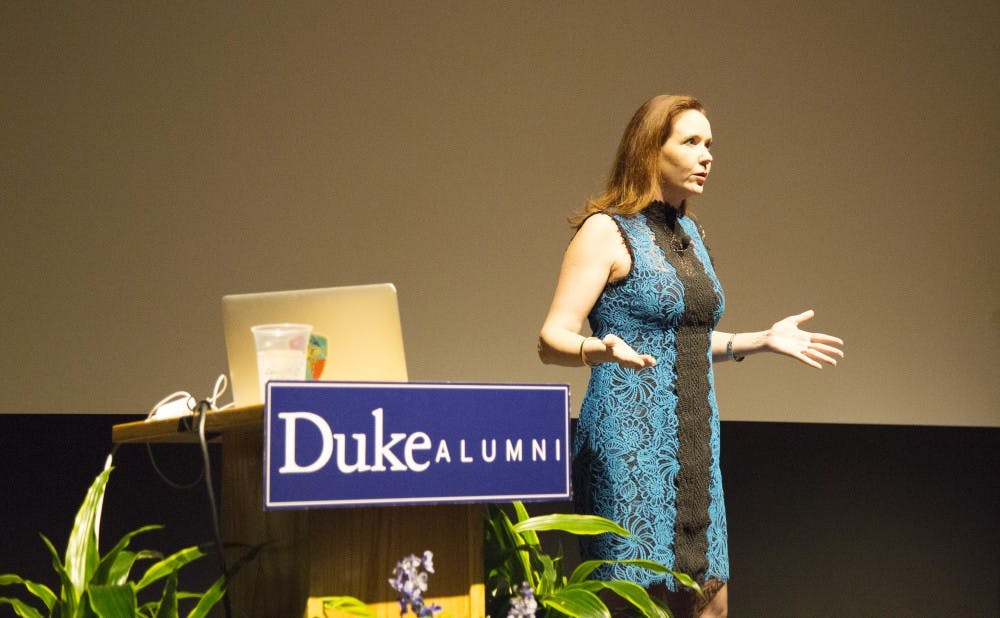When Sally Hogshead, Trinity ’91, skipped onto the stage of Griffith Film Theater Thursday night—her dark eyes sparkling and face exuberant—it was clear she knew how to fascinate.
That was the subject of her talk, "How to Fascinate," which was hosted by the Duke Alumni Association. During the event, Hogshead discussed how to harness one's strengths in impressing future employers.
"Twenty-six years ago I was a senior at Duke University. I didn't have a stellar academic record," Hogshead said as an image of her college self standing outside Baldwin Auditorium was projected onto a screen.
She added that as a student, she had often feared that she was not good enough and questioned how she had been accepted.
“I think when you're around people who are really smart and talented, it’s easy to feel that they have it figured out [when you don't],” she said.
As a senior, she had no idea what she wanted to do with her life until someone introduced her to advertising. Knowing that one of her greatest strengths laid in her creativity, Hogshead said she became intrigued by the possibility of a career in that field.
“[Eventually], I learned that the most successful people at Duke and beyond are not focusing on their majors, they're focusing on how they’re uniquely different [from their peers],” she said.
Having built a career advertising for companies like BMW and Jägermeister, it was that initial epiphany of hers that became the springboard for Hogshead's company, Fascinate, as well as her New York Times bestselling books.
Prior to the talk, Hogshead sent everyone registered for the event the link to take her personality test, "How to Fascinate." The quiz consists of 28 questions and asks the test-taker to rank aspects of their personality on a scale of "not me" to "totally me." Characteristics asked about range from "I prefer to have a select inner circle in my work or social life" to "I actively seek positions of authority."
Once the test results are out, participants are told their primary and secondary advantages as well as their archetype. For example, if somebody has the primary advantage "passion: you connect with emotion" and the secondary advantage "alert: you prevent problems with care," then they are given the archetype "the orchestrator: attentive, dedicated, efficient."
“I want to show you today that you are fascinating, that you do have something to offer," Hogshead said. "The reason we don’t think we’re fascinating is because over the course of our lives, we’re told we’re not good enough.”
She projected a photo of her report card from 1981, where her math teacher had written that she was creative but her approach to algebra was too erratic. Hogshead explained that although this comment upset her at the time, she now wishes it had helped her to begin to recognize her own creative traits.
"You don’t need to fix yourself, but you need to know what you’re doing right," she said.
Hogshead spoke about how people tend to lose interest in everyday things after nine seconds. That is why, she said, it is key to know one's own strengths and to leverage them in fascinating an audience.
"The brain, when it’s in a state of fascination, is like falling in love," she said. "When you fascinate someone, they’re not distracted."
Hogshead explained that such a mindset is the key to succeeding at job interviews—figuring out what you are good at and using that to fascinate your potential employer. She noted that many jobs will not be right for one's strengths, but being cognizant of these mismatches will make it easier to find a fit.
“You must strategically polarize, you are not right for everyone,” Hogshead said.
She invited her teenage son to come onstage as she launched into specifics about the various archetypes in her personality test. To illustrate the effect of interactions between differing archetypes, Hogshead highlighted how her primary advantage was "passion" and her son's was "mystique.” She said that this could be problematic in their relationship, because she loves to be around people, while her son prefers to be in very small groups. Yet, by developing her personality test, she was able to better understand her son's distinctly different way of interacting with the world early on, and could thus improve their relationship.
Hogshead also explained how the personality test could be used in management settings.
“If you hire somebody with a similar personality to you, you have to know that [it may not work out well],” Hogshead said.
This is because two personalities that are very alike will have similar weaknesses, she explained. In her case, she deliberately hires individuals with alert personalities to counteract her less detail-oriented archetype.
Hogshead ended her talk by emphasizing that the most important thing to know about one's archetype is the adjectives associated with it. It is with those adjectives that one can create their "anthem", which is the way they describe themselves in job interviews or on LinkedIn.
Using Southwest Airlines as an example, Hogshead showed how its motto, "friendly practicality,” is a strong depiction of how they seek to separate themselves from other airlines such as Delta.
"I want you to remember [this],” she said, as her talk came to a close. "You don’t have to change who you are, I want you to become more of who you are."
Get The Chronicle straight to your inbox
Signup for our weekly newsletter. Cancel at any time.

